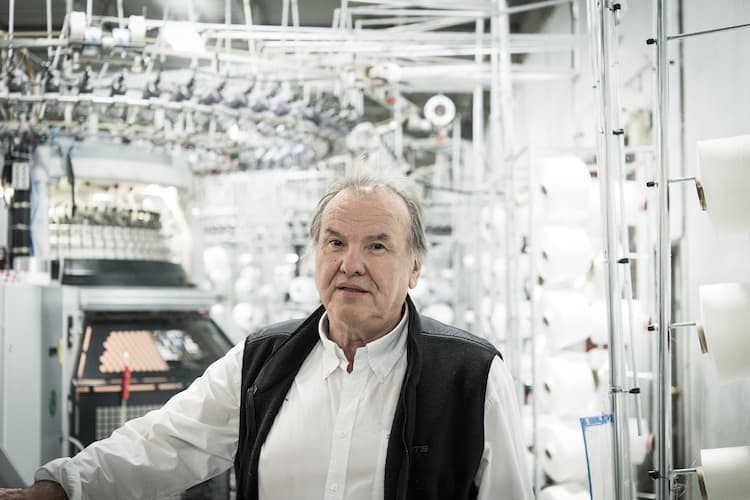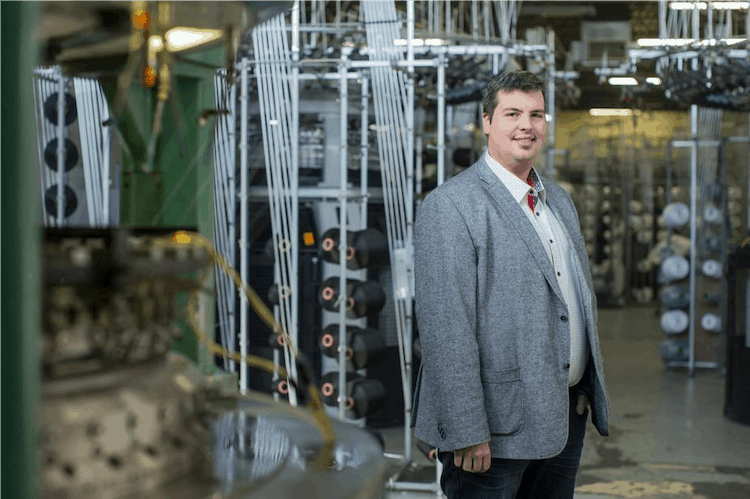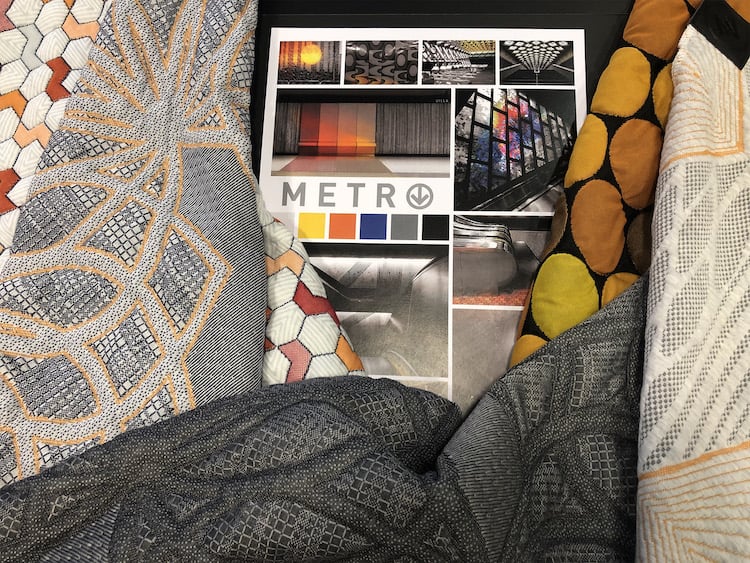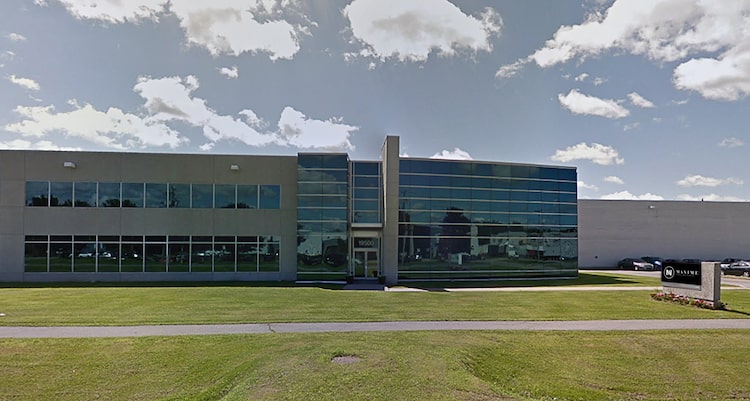Maxime Knitting grows by adding capacity, innovating through fabrics and expanding its services
A newcomer to the bedding industry just 16 years ago, Maxime Knitting Mills Inc. has grown into one of the largest suppliers of knitted mattress fabrics in North America and a valued resource for a range of other sleep-related products and services, including zippered covers and cut-and-sew work.
The Montreal-based company has come a long way since its founding by Denis Thériault in 1985. Thériault started his business after working for years as a mechanic in another textile mill. His initial specialty was apparel, but facing import competition from Asia and Mexico, he made the difficult decision to switch production to bedding textiles.

“My father took everything he had saved from the previous 20 years and invested in six European knitting machines for use in making ticking for mattresses,” says Maxime Thériault, president of Maxime Knitting since 2014. “It was a big risk that he had to take because he knew his company could no longer survive in the apparel business.”
To assist with the company’s transition, Denis Thériault brought on Lorne Romoff, a former competitor. The two executives had a wealth of experience knitting apparel, but no knowledge of bedding.
“Knitting was the easy part,” says Romoff, vice president of sales and marketing. “The challenge was getting up to speed on the nuances of a completely new industry. We had to gain an understanding of these customers’ needs and how they worked.”
For the first few years, Maxime Knitting concentrated on serving bed producers in Canada. “We were the only circular knitter in Canada, so that opened doors for us,” Maxime Thériault says. “In those days, most ticking in North America was woven rather than knitted.”

As Maxime Knitting’s base of business grew, the company began to expand its reach. In 2008, it entered the U.S. market, which was dominated by a handful of big fabric suppliers.
“We started hiring salespeople and putting together a comprehensive line of products,” Thériault says. “Over time, knits became more and more important and our business took off.”
Accent on innovation
In recent years, Maxime Knitting has been a frequent honoree on Canadian Business magazine’s annual ranking of the country’s fastest growing companies. The past five years have been particularly strong for the company, as knitted fabrics became the cover of choice for boxed beds and a wide range of other mattress constructions.
“Knits offer a perfect blend of style and performance,” Romoff says. “They’ve become the top choice for panels and, in the past few years, have become very popular for borders, as well. Knitted borders are easier to work with when you’re building a bed, and they provide a crisp, clean look that’s a great match for today’s bed designs.”
Knits also are softer, are less likely to wrinkle and have much faster recovery times than wovens when beds are unboxed, Romoff says.
AT A GLANCE
Company
Maxime Knitting Mills Inc.
Headquarters
Montreal
Specialty
Knitted fabrics for mattresses, foundations and pillows, including double-knit jacquards and multidirectional fabrics. The company also offers fabric finishing, foam lamination, cut-and-sew services and mattress fulfillment.
Founded
Founded in 1985 by Denis Thériault as a producer of knitted apparel fabrics. In 2005, it changed its business model to focus on knitted sleep fabrics.
Ownership
Privately held company owned by Denis
Thériault and his son, Maxime
Learn more
In building its business, Maxime Knitting has focused on delivering innovative designs backed by professional, responsive service. Executives say the company often has pushed the envelope with its colors, patterns and textures, seeking to lead the market and expand the canvas for bed design. To achieve this mission, the company continually adopts new manufacturing techniques and machinery.
“We were one of the first companies to introduce knitted borders, and we also led the way with our hybrid blister fabrics,” Romoff says, adding that Maxime Knitting purchased new German-made knitting machines a few years ago that enable the company to produce blisterlike textures at a much more affordable price.
In 2016, Maxime Knitting opened an Innovation Campus near its main plant in Montreal. The $3 million facility has 10 knitting machines dedicated solely to producing samples and developing new designs for future production. The center also houses other cutting-edge equipment used to develop products and train designers, technicians and mechanics.

“We can now produce samples in less than 24 hours rather than the two or three weeks it used to take,” Thériault says.
Having a dedicated space for innovation and product development enables Maxime Knitting to be more productive because it doesn’t have to interrupt work in progress to make samples, Thériault says. If a customer has an idea or wants to see a fabric in a different color, the company typically can turn that sample around the same day.
The Innovation Campus also provides an ideal setting for experimentation, Thériault adds. “Our team of six designers will brainstorm together on new ideas, and they have all the latest technologies and tools on hand to help them,” he says. “Since our background is in fashion, we often draw on that experience and what we’re seeing on the horizon to create fresh designs for bedding.”
While sleep fabrics account for 96% of Maxime Knitting’s business today, about three years ago, the company began making apparel fabrics again. The return to its roots was a response to a request from a Canadian customer looking for a local source for knitted fabrics.
According to Romoff, Maxime Knitting’s design team continually works on new ticking and border designs. “Every few weeks, our creative department sends out a sampling of new products,” he says. “It opens up a conversation with customers. They will review the samples and say, ‘I like that, but can you do this?’ We work together to help them create a distinctive look tailored to their brand.”
Last year, Maxime Knitting tried something new with its fabric designs. The company teamed up with two local artists and adapted their paintings into ticking designs. “It was something exciting and different for our customers in Canada,” Romoff says. “They loved the originality of this approach, and we hope to introduce these designs to key accounts in the U.S., as well, as we head into 2021.”
Known for its bold, creative presentations at ISPA EXPO and other global trade shows, Maxime Knitting’s team believes it is important to push the boundaries of what’s expected with their designs. “Not all of our more avant-garde introductions end up being made, but they always spark interesting conversations — and ideas for other fabrics,” Romoff says.
A growing presence
Maxime Knitting occupies five buildings with a total of 350,000 square feet of space. The footprint includes three sites in Montreal, a 50,000-square-foot production plant in Guadalajara, Mexico, and a distribution center in Charlotte, North Carolina. The site in Mexico, which began production a year ago, is a “mirrored” facility equipped with the same machinery in a similar setup as the main plant in Montreal. It offers everything from knitting and finishing to complete cut-and-sew covers.

The plant in Mexico provides an alternative for the “price-sensitive customer — particularly larger bed producers looking for a long-term strategic partner,” Romoff says. “This facility enables us to hit lower price points that would be difficult to achieve at our Montreal facilities and provide the fabrics our customers need to stay competitive.”
The company expects to add another 50,000 square feet of capacity and new machinery in Mexico this year to keep up with growing demand. Currently, there are 16 knitting machines on-site.
In Montreal, Maxime Knitting has 80 knitting machines, including 14 machines it bought recently. In 2020, the company also added a second finishing line in Montreal.
“We are always looking for new ways to expand our capabilities and improve our efficiencies,” Thériault says. “Our business is constantly changing, and it’s important that we stay current.”
Maxime Knitting is one of the few companies in the industry that uses automatic cutters, Thériault adds. “We try to be as automated as we can. We would never replace a skilled sewer with a machine,” he says. “But if we can cut down the amount of hand labor that goes into prep work, like cutting, we’ll take advantage of that opportunity.”
The company typically employs 250 workers in Montreal and an additional 135 workers in Mexico and the United States. At times of peak volume, the company’s total workforce grows from 385 workers to as many as 500 workers.
One-stop shopping
Maxime Knitting opened TM Couture, its sewn cover service, in 2015. Growth continues to be strong, Romoff says.
“TM Couture offers complete, end-to-end solutions for mattress and box spring covers,” he says. “Instead of buying a cover or border fabric from us and then sending it to another company for sewing, finishing or laminating, we can handle all of those steps in-house.”

As is true across the industry, performance finishes are increasingly popular among Maxime Knitting’s customers. The company offers a full range of high-performance finishes, including cooling, wicking and antimicrobial applications. Bestsellers include the proprietary MaxBreeze brand, which uses phase-change microcapsules to absorb excess heat and maintain a comfortable sleep surface.
“Cooling finishes have been very strong for the past 18 months and demand for antimicrobial products also is growing due to the Covid situation,” Romoff says.
In terms of yarns, Maxime Knitting is seeing growing interest in natural fibers, such as hemp and cashmere, as well as polyester yarns made from recycled plastic bottles. “Recycled polyester is a big trend right now,” Romoff says. “Our designers are working on lots of creative designs with this material.”
Maxime Knitting offers customers a wide assortment of yarns, including organic cotton, rayon-bamboo, rayon-cashmere, rayon-silk and Tencel. The company also serves as the exclusive American distributor for Maes, a producer of woven damask fabrics based in Zwevegem, Belgium.
Maxime Knitting also offers a variety of laminated textiles, including fire-resistant and water-repellent applications, as well as specially coated fibers that enhance the strength of fabric.
If a customer desires, Maxime Knitting can laminate foam and ship completed beds directly to stores or consumers. “We can do it all,” Romoff says. “We knit, manufacture zippered covers, laminate foam and ship. Some of the boxed bed specialists would rather concentrate on what they do best — sales and marketing — so we’ll help them with whatever else they might need.”
This can-do spirit is a key element in Maxime Knitting’s success, according to Thériault. “We won’t say no to an idea without fully exploring it,” he says. “Everyone takes great pride in doing their best.” The company’s three core values, he adds, are quality, passion and flexibility.
The company’s culture was established by founder Denis Thériault, who continues to serve as chair of the board. “Even though we’ve grown into a much bigger company, those family business values remain,” says Maxime Thériault, who grew up around the company and has worked virtually every job since graduating from the University of Montreal in 2007. “We always try to go the extra mile for our customers.”
“A trusted ally”
One example of going the extra mile is a change that Maxime Knitting made to the design of its shipping skids. “At the time, everyone was using 4-foot-by-8-foot skids,” Thériault says. “When the rolls were loaded onto trucks, they would sometimes bend, hit the floor and get dirty.” As a result, customers sometimes would have to cut off a portion of fabric at the ends.
To solve this problem, Maxime designed longer skids that kept the rolls securely suspended above truck floors. “When a customer gets our fabric now, it’s impeccable,” Thériault says. “There’s no damage and no waste.”

In 2020, Maxime Knitting’s ability to work closely with its customers to solve problems proved even more important. This was especially true during the summer when, as Thériault says, mattress sales “went from 0 mph to 160 mph almost overnight” and many suppliers found themselves short of the raw materials needed to keep up with demand from bed makers. “Our philosophy has always been to keep an ample supply of key materials on hand, so we were in pretty good shape,” Thériault says. “We see ourselves as a trusted ally of our customers.”
While 2020 was highly challenging, the company continued the pattern of double-digit growth it has registered for the past decade. When the coronavirus pandemic first hit Canada, leading to lockdowns on businesses, the company quickly switched gears and formed MKMedic.com, an e-commerce site for medical-grade masks, gowns and caps. As an approved medical provider, Maxime Knitting was able to keep its workforce engaged with mask production until restrictions were relaxed in June.
Since the summer reopening, Maxime Knitting has enjoyed a steady flow of business. “We didn’t know what to expect, given the circumstances, but were pleasantly surprised to find that the bedding industry was so resilient,” Thériault says. “When everything opened up again in the summer, everyone seemed to want a new bed.”
As vaccines are rolled out and the threat of the pandemic wanes, Maxime Knitting is on the lookout for opportunities to expand its business in North America and other markets. Canada, Mexico and the United States account for the bulk of its sales, but the company also does business in Australia, China, India, New Zealand and South Africa.
“We can’t wait until the travel ban is over and we can get back out on the road and meet face to face with our customers in the U.S. again,” Romoff says. “Our sales force has done a great job of covering the market for us during this period of limited travel, but there’s nothing like getting out in the field and meeting with our partners.”



